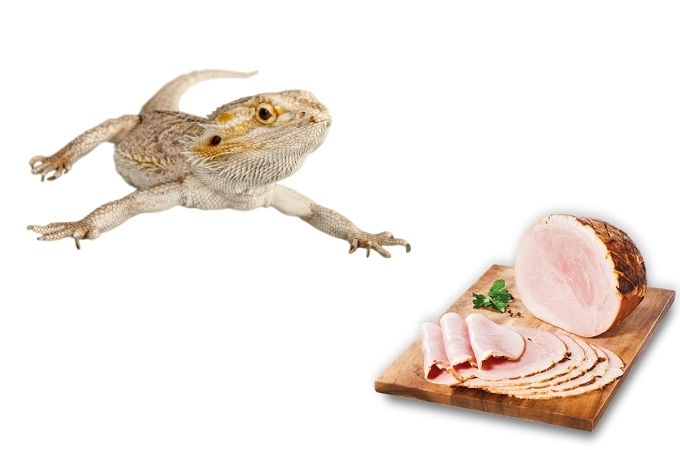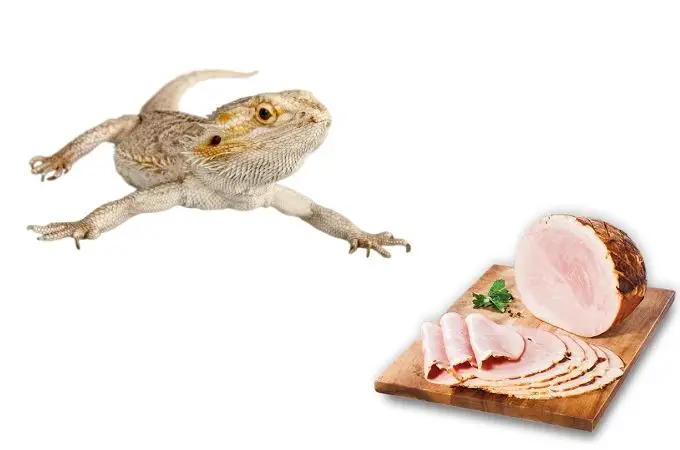Bearded dragons are fascinating creatures that make for great pets. As a responsible pet owner, you want to ensure that your beloved bearded dragon is getting the right nutrition. This brings up the question, can bearded dragons eat ham?
While ham may seem like a protein-rich food, it’s important to understand the dietary requirements of bearded dragons before feeding them anything. In this article, we’ll explore the nutritional value of ham and whether or not it’s a suitable food for your bearded dragon. So, let’s dive in and find out if ham is on the menu for your scaly friend!
While bearded dragons are omnivorous and can eat a variety of foods, ham should not be a part of their diet. Ham is high in fat and salt, which can lead to kidney problems and obesity in bearded dragons. Furthermore, ham does not contain the necessary nutrients that bearded dragons need to stay healthy. Instead, offer your bearded dragon a diet of insects, leafy greens, and occasional fruits and vegetables to ensure they receive the proper nutrition they require.

Can Bearded Dragons Eat Ham? The Ultimate Guide
Bearded dragons are popular pets that are known for their docile nature and unique appearance. As with any pet, it’s important to provide them with a balanced and nutritious diet. One question that often comes up is whether or not bearded dragons can eat ham. In this article, we will explore the topic in depth and provide you with all the information you need to make an informed decision.
H3: What is Ham?
Ham is a type of meat that is typically made from pork. It is cured and sometimes smoked, giving it a distinct flavor. Ham can be prepared in a variety of ways, including baked, fried, or grilled.
While ham can be a tasty treat for humans, it’s important to consider whether or not it’s safe for your bearded dragon to eat.
H3: Can Bearded Dragons Eat Ham?
The short answer is no, bearded dragons should not eat ham. While it may seem like a harmless treat, ham can actually be harmful to your pet. Here are a few reasons why:
1. High in Sodium – Ham is high in sodium, which can be harmful to bearded dragons. Too much sodium can lead to dehydration, kidney problems, and other health issues.
2. Not Nutritious – Ham is not a nutritious food for bearded dragons. It doesn’t provide the vitamins and minerals that they need to stay healthy.
3. High in Fat – Ham is also high in fat, which can lead to obesity and other health problems.
Overall, it’s best to avoid feeding ham to your bearded dragon.
H3: What Should Bearded Dragons Eat?
Bearded dragons are omnivores, which means they eat both plants and animals. A balanced diet for a bearded dragon should include a variety of fruits, vegetables, and insects.
Here are some foods that are safe and nutritious for bearded dragons:
1. Leafy Greens – Bearded dragons love leafy greens like kale, collard greens, and mustard greens. These foods are high in vitamins and minerals.
2. Vegetables – Vegetables like carrots, squash, and bell peppers are also good choices for bearded dragons.
3. Insects – Bearded dragons need protein, and insects like crickets, mealworms, and dubia roaches are great sources of protein.
H3: Benefits of a Balanced Diet
Providing your bearded dragon with a balanced and nutritious diet has many benefits. Here are just a few:
1. Good Health – A balanced diet can help keep your bearded dragon healthy and free from illness.
2. Longevity – A healthy diet can help your pet live a longer, happier life.
3. Behavior – A balanced diet can also improve your bearded dragon’s behavior, making them more active and playful.
H3: Conclusion
While it may be tempting to feed your bearded dragon a tasty treat like ham, it’s important to consider their health and well-being first. Ham is not a nutritious food for bearded dragons and can actually be harmful to their health. Stick to a balanced diet of fruits, vegetables, and insects to keep your pet healthy and happy.
Frequently Asked Questions
Bearded dragons are popular pets that require a balanced diet consisting of vegetables, fruits, and protein. If you are considering feeding your bearded dragon ham, here are some frequently asked questions and answers to help you make an informed decision.
Can bearded dragons eat ham?
While ham is not toxic to bearded dragons, it is not recommended as a regular part of their diet. Ham is high in fat and salt, which can cause health problems in bearded dragons if consumed in large quantities. Additionally, bearded dragons are herbivores and require a diet that is high in fiber and low in fat.
If you want to give your bearded dragon a treat, you can offer small pieces of cooked chicken or turkey as a source of protein. However, these should only be given in moderation and should not replace their regular diet of vegetables and fruits.
What are the risks of feeding ham to bearded dragons?
Feeding ham to bearded dragons can increase their risk of obesity, heart disease, and kidney problems. Ham is high in fat and salt, which can cause health issues in bearded dragons if consumed in large amounts. Additionally, bearded dragons have sensitive digestive systems and may experience diarrhea or other digestive problems if they eat too much ham.
If you are interested in providing your bearded dragon with a high-quality protein source, consider feeding them insects such as crickets or mealworms, which are a natural part of their diet in the wild.
Can bearded dragons eat ham as a treat?
While it is not recommended to feed ham to bearded dragons on a regular basis, small pieces of cooked ham can be offered as a treat in moderation. When giving your bearded dragon a treat, it is important to ensure that it is a healthy option that does not contain excessive amounts of fat or salt.
If you decide to give your bearded dragon a treat, make sure that it is only a small amount and does not make up a significant portion of their diet. Additionally, be sure to monitor your bearded dragon for any signs of digestive problems or health issues after giving them a treat.
What are some alternative sources of protein for bearded dragons?
Bearded dragons require a balanced diet that consists of vegetables, fruits, and protein. While ham is not a recommended source of protein for bearded dragons, there are several alternatives that you can offer. Some healthy sources of protein for bearded dragons include:
- Insects such as crickets, mealworms, and dubia roaches
- Small pieces of cooked chicken or turkey
- Eggs (cooked or raw)
- Low-fat cottage cheese
When offering your bearded dragon protein, it is important to ensure that it is a healthy option that is low in fat and salt. Additionally, be sure to monitor your bearded dragon for any signs of digestive problems or health issues after introducing a new food to their diet.
How often should bearded dragons be fed?
The frequency of feeding your bearded dragon will depend on their age and size. Young bearded dragons should be fed more frequently than adults, as they require more protein and nutrients to support their growth. Generally, bearded dragons should be fed once or twice a day, depending on their age and size.
It is important to provide your bearded dragon with a balanced diet that consists of vegetables, fruits, and protein. Avoid feeding your bearded dragon foods that are high in fat or salt, as these can cause health problems over time.
THIS CAN KILL YOUR BEARDED DRAGON AFTER A BATH! #shorts
In conclusion, while bearded dragons are omnivorous and can eat a variety of foods, ham is not a recommended part of their diet. Although ham may seem like an easy and tasty treat for your pet, it is high in salt and fat, which can lead to health problems such as obesity and cardiovascular disease.
It is essential to remember that a bearded dragon’s diet should consist mainly of vegetables, fruits, and protein-rich insects such as crickets, mealworms, and dubia roaches. These foods provide the necessary nutrients for your pet’s growth and development.
In summary, while it may be tempting to offer your bearded dragon a piece of ham as a treat, it is best to avoid doing so. Instead, focus on providing a balanced and healthy diet of vegetables, fruits, and insects. Your bearded dragon will thank you for it by staying healthy and happy for years to come.


